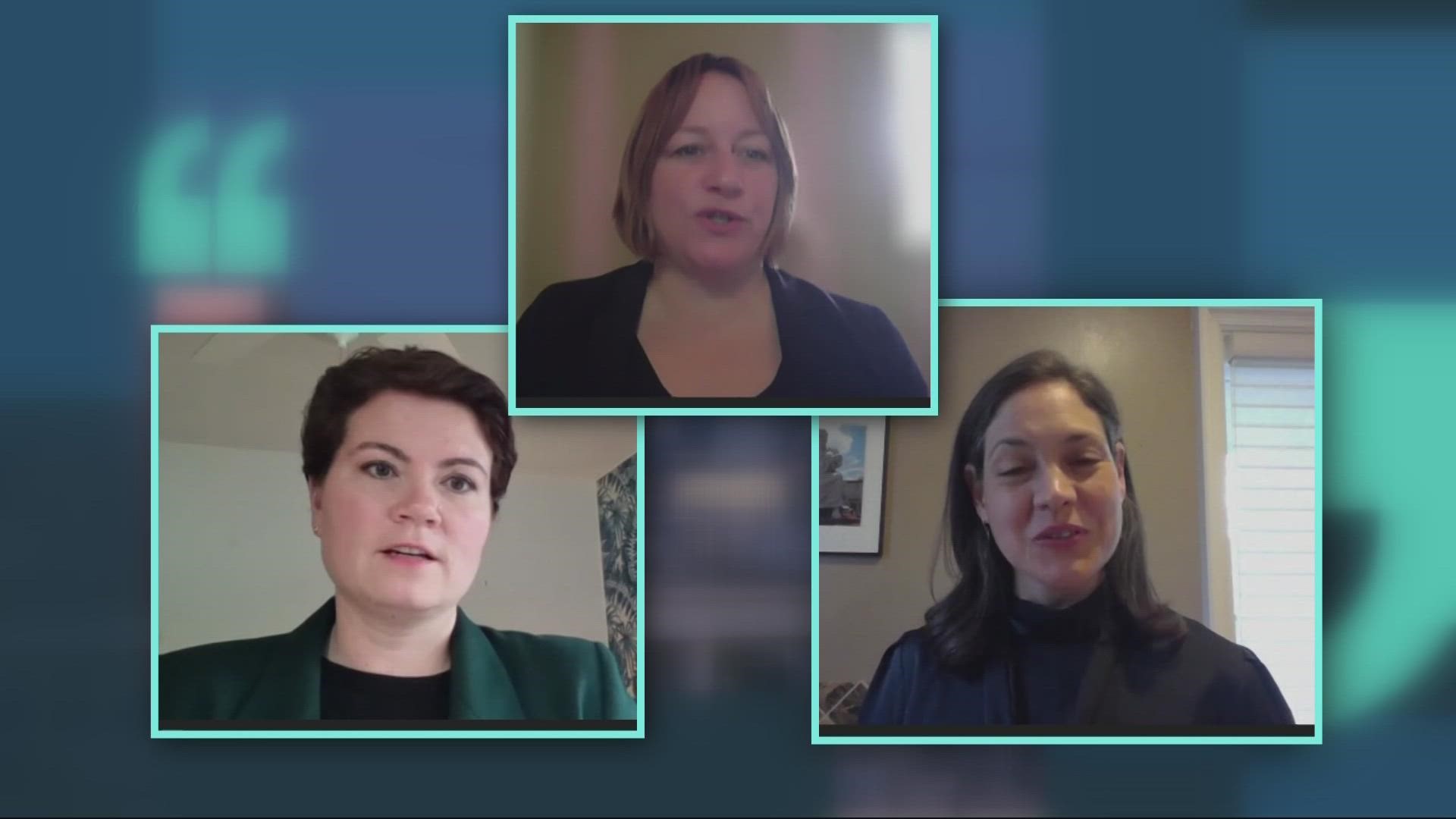SALEM, Ore. — Three state representatives in the Oregon House will not seek reelection this year, all for the same reason: they can no longer afford to support their families with the legislature's "part-time" salaries.
Rep. Karin Power (D-Milwaukie), Rep. Rachel Prusak (D-Tualatin/West Linn) and Rep. Anna Williams (D-Hood River) will serve out the remainder of their terms, but say the extremely low pay for a job that is, in reality, full-time work has put unsustainable burdens on them and their families.
Currently, Oregon state legislators are paid a salary of less than $33,000 a year. The legislature meets for 35 days in even years — the "short session" — and six months during odd years. During sessions, lawmakers are working 80-hour weeks, Prusak said — add in special sessions, constituency work, policy work, task forces and overseeing agendas, and it doesn't even come close to part-time.
Many lawmakers continue to hold down second jobs, sometimes working more than one part-time job to make ends meet.
"Between bills, students loans, and two kids in daycare, I've never been able to stop working my second job during session," Powers said. "I dropped to part-time during session for my second job, which means I work all the time. It places an enormous caregiving burden on my wife and my in-laws, because I will turn around and continue working through the weekend to catch up. We can't make ends meet on the legislative salary alone. That wouldn't be financially feasible for us. So it became increasingly clear this public service was not sustainable for my family."
Williams said her family had to put off other financial obligations, like student loans, just so they could pay the bills.
"We thought we could figure out a way to make ends meet and pay the bills," Williams said. "Over the course of four years we spent all of our savings, suspended paying our student loans, borrowed money from my mom and finally ran out of financial cushion. It just became unsustainable, and really couldn't figure out another way to make ends meet."
It's also a reminder of how the pandemic, as well as the rising cost of childcare, have disproportionately affected women, particularly mothers. Women left the workforce in unprecedented numbers when the pandemic hit — roughly 3.5 million mothers with school-age children either lost jobs, took leaves of absence or left the labor market altogether, according to an analysis by the Census Bureau. They have not returned to work at the levels experts predicted, even with schools fully reopened. Childcare in Oregon is difficult to find and very expensive.
During the short session this year, lawmakers considered a bill that would boost their pay to match the state's average wage. That would bring salaries up to about $63,000, according to legislative analysis.
The bill stalled in committee, but received support from a number of organizations that submitted written testimony, including the ACLU of Oregon, the Oregon Economic Justice Roundtable and Family Forward Oregon, which supports working mothers, caregivers and families.
"Historically, Oregon’s Legislature has been whiter, wealthier, and older than Oregon’s general population," wrote Courtney Helstein, the political director of Family Forward Oregon. "While representation has improved in the last couple years, Oregonians who are young, low-income, BIPOC, and parents/caregivers still struggle with access and resources to run for office. The current low salary of legislators also discourages these populations to even think about running in the first place."
Many advocates have argued Oregon's low-paying legislature salaries allow only those with personal or family wealth to pursue jobs in public service, and keeps diverse candidates from running at all.
"People got elected in the last election that makes our legislature look like what Oregon looks like as a whole, from age diversity, gender diversity, LGBTQ status and racial diversity," Rep. Williams said. "The challenge is keeping those folks. The younger ones with families are trying to find a way to make it work. We got all these folks in, now the challenge is keeping them."
Rep. Prusak, who is also a nurse practitioner, said it was the right decision to leave the legislature, but it's especially frustrating because she felt she had finally hit her stride at the Capitol.
"When I finally know how to do the job well, who to fight with, who to go to, who to have the conversations, who to get the buy in from, is when you're exhausted. You've run two campaigns, you've done it for four years, and as you go into your third campaign in year six and seven, that's when it all starts to crush you and feel unsustainable," Prusak said.
RELATED: Oregon short session ends with millions of dollars allocated to housing, education, workers
Powers said some of her colleagues would employ their spouse or kids as chief of staff or legislative aides to make up for the low pay.
"Our staff often make two to three times as much as we do. That can really help a household budget," Powers said. "I'm not sure if that is something that best serves the public, and it is unfortunately part of how folks have had to make it work."
"When I first ran and was told 'you can't work full time and run this really hard campaign,' I was like no, I have to run while I work. I don't have any other way. How do you pay your mortgage? How do you pay your school loans? It's not sustainable," Prusak said. "We need to make sure we inform constituency how important it is to professionalize the legislature because it ends up being better policy and holding agencies accountable. And that's what they want us to do."

